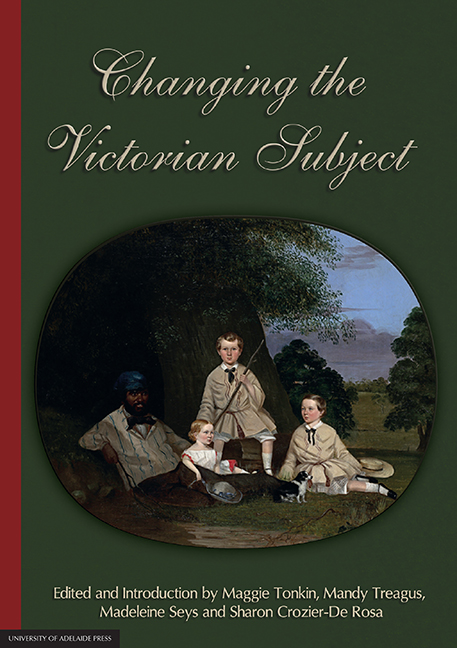Book contents
- Frontmatter
- Contents
- Notes on Contributors
- 1 Re-visiting the Victorian subject
- 2 Queen Victoria's Aboriginal subjects: a late colonial Australian case study
- 3 Identifying with the frontier: Federation New Woman, Nation and Empire
- 4 A ‘Tigress’ in the Paradise of Dissent: Kooroona critiques the foundational colonial story
- 5 The making of Barbara Baynton
- 6 A literary fortune
- 7 Olive Schreiner's From Man to Man and ‘the copy within’
- 8 Guy Boothby's ‘Bid for Fortune’: constructing an Anglo-Australian colonial identity for the fin-de-siècle London literary marketplace
- 9 The scenery and dresses of her dreams: reading and reflecting (on) the Victorian heroine in M.E. Braddon's The Doctor's Wife
- 10 The woman artist and narrative ends in late-Victorian writing
- 11 Miss Wade's torment: the perverse construction of same-sex desire in Little Dorrit
- 12 ‘All the world is blind’: unveiling same-sex desire in the poetry of Amy Levy
- 13 From ‘Peter Panic’ to proto-Modernism: the case of J.M. Barrie
2 - Queen Victoria's Aboriginal subjects: a late colonial Australian case study
Published online by Cambridge University Press: 05 December 2014
- Frontmatter
- Contents
- Notes on Contributors
- 1 Re-visiting the Victorian subject
- 2 Queen Victoria's Aboriginal subjects: a late colonial Australian case study
- 3 Identifying with the frontier: Federation New Woman, Nation and Empire
- 4 A ‘Tigress’ in the Paradise of Dissent: Kooroona critiques the foundational colonial story
- 5 The making of Barbara Baynton
- 6 A literary fortune
- 7 Olive Schreiner's From Man to Man and ‘the copy within’
- 8 Guy Boothby's ‘Bid for Fortune’: constructing an Anglo-Australian colonial identity for the fin-de-siècle London literary marketplace
- 9 The scenery and dresses of her dreams: reading and reflecting (on) the Victorian heroine in M.E. Braddon's The Doctor's Wife
- 10 The woman artist and narrative ends in late-Victorian writing
- 11 Miss Wade's torment: the perverse construction of same-sex desire in Little Dorrit
- 12 ‘All the world is blind’: unveiling same-sex desire in the poetry of Amy Levy
- 13 From ‘Peter Panic’ to proto-Modernism: the case of J.M. Barrie
Summary
In the same year that Queen Victoria came to the throne, the British House of Commons Select Committee on Aboriginal Tribes (British Settlements) issued its much-awaited report. The report was strongly influenced by the mood of evangelical humanitarianism that over the last several years had risen to change the political direction of the Colonial Office, and that had only recently led to the abolition of slavery in Britain's colonies. With imperial governmental attention now turned to the rights of Aboriginal people, the report reflected with dismay on the past colonial practices that had seen Aboriginal people's lands ‘usurped’, their numbers ‘diminished’ and their character ‘debased’ (77). The report's recommendations on future colonial policy were geared around the principles that Aboriginal people must receive the law's protection as British subjects, and that through the protection of these rights they would ultimately be taught the benefits of Christianisation and civilisation.
Until this point in the Australian colonies, the legal status of Aboriginal people had remained profoundly ambiguous. The fictional principle that Australia was settled peaceably rather than taken by force from a sovereign people implied from the outset that Aboriginal people would be treated as subjects of the Crown. This was embedded in the instructions issued in April 1787 to Captain Arthur Phillip, the first governor of New South Wales, which urged him to ‘endeavour by every means in his power’ to conciliate the goodwill of Aboriginal people and, if settlers ‘should wantonly destroy them’, to ‘cause such offenders to be brought to punishment’.
- Type
- Chapter
- Information
- Changing the Victorian Subject , pp. 21 - 36Publisher: The University of Adelaide PressPrint publication year: 2014



